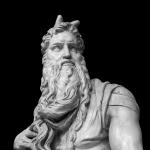In this series I am looking at three different interpretations of history. In part 1, I discussed the view of history that claims history is an endless cycle of recurrence and repetition. This idea of an endlessly recurring world of either eternally repeating identical histories, or of endless, variant histories, has both ancient and modern proponents. The most famous of these were the Greek Stoics and the German philosopher Nietzsche. It is noteworthy that most Stoics, as well as Nietzsche, believed history literally repeated itself the same way every time, without variance.
In part 2, I outlined a view held by more modern thinkers, which I called the “Progressive” view of history. On this view, history is progressing, qualitatively, toward an ultimate culmination point. This movement toward a perfect end-state for some, like G.W.F Hegel, is caused by an immanent, quasi-divine principle of rationality. Hegel thought of this as a dialectic of idealism, a form of Absolute Idealism. For others the causal mechanism is not a dialectic of pure thought. Instead, it is a history of material processes leading to a kind of social utopia. Marx is the most representative of this kind of progressive view of history.
Each of these interpretations of history has their problems, however. Some of those problems seem fatal to the views. For example, the recurrence view seems not only impossible to verify, it is deeply counterintuitive. While it could be the case that the universe extinguishes itself and then “poof!” recreates itself into existence, there would be no way to know this is not the case. However, one would have to assume on this view, contrary to our deepest intuition about the nature of cause and effect, that universes really can and do pop into existence uncaused from nothing (or, even more absurd, that non-existent things can cause themselves to come into being).
As to the progressive view of history, one might assume we are advancing in some qualitative way toward a utopian end state. Yet any honest glance at the state of human affairs would suggest otherwise. Some things, like technology, may truly be advancing. But to think human nature, especially human morality, is advancing is, at best, wishful thinking and, more likely, delusional. The thought that human beings or their societies are advancing in some morally significant way simply doesn’t pass muster. Even Hegel himself, the father of all contemporary “evolutionary” thought, struggled to explain the perpetuity of vice in the world:
But even regarding History as the slaughter bench at which the happiness, wisdom and virtue of peoples have been sacrificed, the question naturally arises: to what principle, to what final purpose, have these monstrous sacrifices been offered?
in Peter Kreeft, Socrates’ Children, Vol III (173)
Hegel has no recourse on his view to a theory of sin, fallen creation and the need for a savior and redeemer of history. On his immanentized view of the Logos, evil is indeed necessary. In fact, evil is a necessary part of Hegel’s god of historical becoming. As Peter Kreeft notes “one cannot help wondering how this philosophy would have sounded to a Jew in Auschwitz?” (Socartes’ Children, 173). Of course, one can also not help wondering if the reason for Auschwitz was the philosophy of Hegel!
Given such fatal flaws in both of these interpretive views, it seems warranted to look elsewhere for a more reasonable approach to the question of “what is history like?”
A “Mere Christian” Description of History
Let’s sketch a basic view of history from a broadly Christian perspective. In the end, there will not be one Christian view of history. At least not when it comes down to more minute details. However, generally speaking each Christian view of history will have something like the following basic features:
- Creation: On any orthodox Christian view of history, history has a definitive starting point. That starting point is God’s creation of the world, meaning, the spacetime universe as we know it. This includes any contingent beings within that universe: spirits (angels or demons), human beings, alien beings (if they exist), animals, plants, etc.
- Fall: In addition, on any orthodox Christian view of history, there is an event in human history that is of great significance. This primordial event, whether it happened very long ago, or more recently depending on how we a) calculate time and b) interpret the Bible, nevertheless had immense ramifications for the course of all human and natural history. This event is often called “The Fall,” and it refers to the sin, or the intentional breaking of fellowship, between God’s pinnacle of creation, “man,” and God Himself.
- Redemption: At some point after this central historical event, an event that shapes and informs all other historical events, possibly even those that came before it, another historical event occurs in the same spacetime universe and roughly in the same location. That event, or series of events that we might call “the incarnation, life, death and resurrection of Jesus Christ,” makes possible a redemption of the current spacetime universe that has been affected by the prior event of Adam’s Fall.
- Finally, there is Consummation: a time that has not yet come, but that is coming, whereby the original creation of God, this spacetime universe, will find its end. It will consummate in a new heavens and a new earth for some, and in a place of damnation for others. Minimally, one aspect of this new reality will continue for a potentially infinite time: that of the new heavens and new earth. The other aspect of this new reality, call it “hell,” will either also continue to exist in a potentially infinite time, or it will exist for a while and then cease to exist along with all the people that exist “in” it. A third, less likely, possibility is that at some point in the potentially infinite future, those in hell will find themselves in the new heaven and earth along with the rest and while hell may continue to exist, it will either be empty of residence or only have Satan and his demons as tenants.
I will not provide all of the Biblical references that support these four main ideas, since they are all well known and easy to find. However, here are some main Old Testament and New Testament writings that demonstrate their biblical grounding: Genesis 1:1 & John 1; Genesis 3 & Romans 5; Ezek 36 & Romans 8, and Revelation 20-21.
Given these four basic features of history on a biblical, or revealed, view of history, what can we say about the previous views discussed in our prior posts.
Assessing “Recurrence” from a Biblical View of History
On the biblical view of history, what would we make of the idea that the universe and its history is in an endless looping state of eternal recurrence? First, we would have to say that it is on the whole false. The kind of creation and consummation that the biblical view espouses does not suggest that God creates an infinite number of identical universes, each repeating the same story over and over again. Instead there is a definitive beginning to this universe as well as a definitive end to it, or, at least, a qualitative transformation of this world that makes it like something entirely new. But is it this new universe that persists forever and ever (amen!), and not an endless succession of the same universe (even if each iteration would be numerically unique).
Nevertheless, there is within the biblical view of history, a genuine feature of “recurrence.” It is the type of recurrence that has been captured over and over again in various sayings throughout history, like this one: “Those who do not learn from the past are doomed to repeat it,” (usually attributed to George Santayana). Of course, one could also argue that even those who do remember or learn about the past, still will often repeat the same errors of the past. But why should this, more immanent form of recurrence be the case?
The biblical answer is that there is something like a human nature we all share, and that this human nature has certain fixed features regardless of where, when, or how human persons who have it live. That nature is, after the Fall, a sin nature. But, it is not a nature that is corrupted in totality, even if it is corrupted in every part of itself. Totally depravity, an Augustinian doctrine later associated with John Calvin, does not argue that every human person is as corrupt in their nature as they possibly could be. That is a common, yet false, understanding of “Total Depravity.” What total depravity of human nature means is that every person who has a human nature, which is all of us, is affected in every part of their selves by sin: in their minds, their hearts and their bodies, to varying degrees of corruption.
As such, because there is a fixed human nature, we see recurring patterns of human behavior: some good, some bad. We also see human behavior that is neither morally good nor bad per se, but just common to us given our human design: like playing games or sports, or creating art and music. The problem with those who hold to, or held to, a recurrence view of history is that they take one aspect of history, the patterns of human behavior that are a result of a common nature regardless of place, culture or time, and they apply it to the cosmos as a whole, or, in some cases, even to “god” himself. What makes the biblical view more rational than the recurrence view is that it makes room for certain common-sense features of recurrence, yet without exacerbating the phenomena of recurrence to try to explain far more than it can, like the entire process of the universe.
Finally, in contrast to the recurrence view, the causal “mechanism” that makes, or upholds, history is not some immanent principal or dynamism. Instead, it is the Creator of the universe Himself who sets up a spacetime reality that unfolds and acquires a historical character. Whether that unfolding of the constituents of the spacetime universe occurs strictly through secondary processes of either impersonal nature or personal will, or is directly caused by the Creator is a question for another time.
If the biblical view of history can accommodate recurrence without making it ultimate, what about features of “Progressivism?”
Evaluating The “Progressive” View
Turning toward the Progressive view of history, we can say that the biblical view certainly incorporates important aspects of the progressive view into its own. History is, in a very real sense, moving toward a culmination point on the biblical view. There is an “end-goal” in mind. The question is, “in whose mind?”
The culminating point of history on the biblical view is not determined by some immanent rational principle (Hegel) or by some material process (Marx) or by some corporate act of the human will (Godwin, Condorcet, the Transhumanists). Instead the march toward the final liberation of the world from its bondage is entirely subject to the will of the world’s transcendent Creator (Romans 8). God will bring history, at least this history, to its final point and then there will be a transformation to a new world (Revelation 21).
Within this world, however, there can be partial instances of progression, even in society. For example, most societies have progressed morally in seeing slavery as an innate evil (or have they)? However, moral “progress” is hard won and, even when we think we have made moral progress in one area, we are often blind to the fact of moral barbarity in another area. Today, there are no slaves in most Western countries (or are there?). But, at the same time, babies are butchered in the womb and this is called a “legal” right by many and is even seen as sacrosanct in countries like America and Canada.
Probably more than anything, it is technology that progresses in some qualitatively significant way. But this presents a danger to our thinking. As C.S. Lewis once pointed out (The Problem of Pain, Chapter 5), it is our confusion of technical progress with moral progress, a clear logical error, that facilitates in every new generation a sense of moral or “chronological” snobbery:
If you say that the first men were ‘savages,’ meaning by this that their artifacts were few and clumsy like those of modern ‘savages,’ you may well be right; but if you mean they were ‘savage’ in the sense of being lewd, ferocious, cruel and treacherous, you will be going beyond your evidence.
Problem of Pain, 73 (MacMillan, 1973)
In short, we probably have not progressed all that much as a human society. Unless, of course, we take into account the kind of progression that occurred in culture with the rise of Christianity itself!
With the emergence of Christianity, we may be able to speak of an actual progression of human thought and human behavior. As historian Tom Holland has recently noted in his book Dominion: How the Christian Revolution Remade the World, it was the revolution of Christianity, a “revolution that has, at its molten heart, the image of a god dead on the cross” (525) that spawned real moral evolution in human history. It is only because of this “Jesus Revolution,” this historical event, that we can even talk about the abolition of slavery today, or the inherent value of the victim of oppression, or even have the idea that might really does not make right.
Conclusion: The Biblical View of History is The Best View of History
This has been a long series of posts. In sum, however, I have argued that while there are aspects of the “Eternal Recurrence” view of history and the “Progressive” view of history that certainly ring true, it is, nevertheless, the biblical view that makes the most sense of history. It successfully incorporates aspects of recurrence and progress that we all sense intuitively, yet without assuming the same fatal flaws in each. And so, we might say, that history itself points to the Bible as the best source of knowledge for how to think about history.















